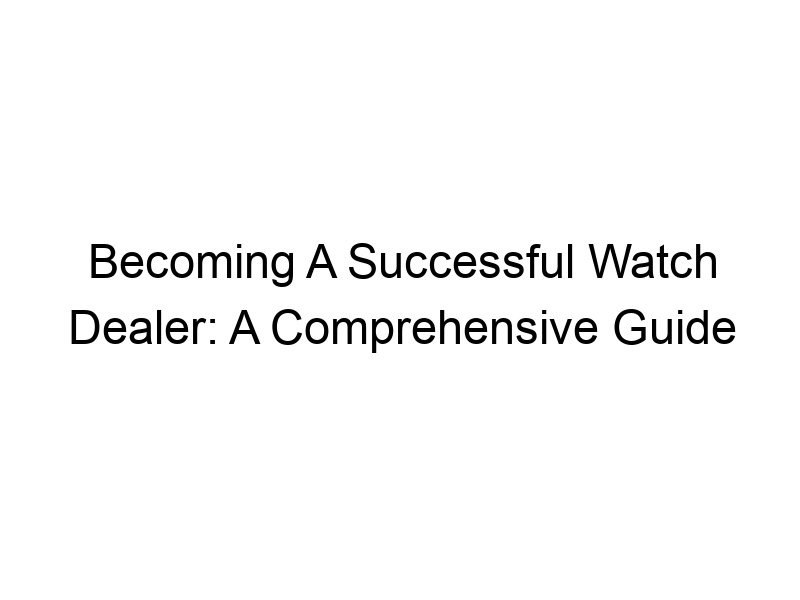The world of luxury watches is alluring, and the prospect of becoming a watch dealer can seem incredibly exciting. But it’s a business requiring significant knowledge, skill, and dedication. This comprehensive guide will walk you through every step, from understanding the market to building your clientele, covering everything you need to know to successfully navigate this competitive yet rewarding field. We’ll explore the intricacies of authentication, pricing, legal considerations, and more, equipping you with the tools to build a thriving watch dealing business.
The luxury watch market is a fascinating blend of history, craftsmanship, and investment. Understanding its nuances is crucial. Popular brands like Rolex, Patek Philippe, Audemars Piguet, and Omega dominate the market, each with its own collectors and price points. Knowing the history, popular models, and current market values of these
brands is paramount.
Identifying Key Players and Trends
Stay updated on market trends through reputable sources like auction house results (Christie’s, Sotheby’s), specialist watch magazines, and online forums. This knowledge helps you identify high-demand watches and emerging brands. Understanding the influence of collectors and celebrities on watch trends is also beneficial.
Market Research and Analysis
Thorough market research is non-negotiable. Analyze sales data from online marketplaces (eBay, Chrono24) and auction houses to understand price fluctuations and demand for specific models. Track the performance of different brands and models to inform your buying and selling strategies.
Building Your Expertise
Developing Your Watch Knowledge
Become a watch expert. Learn about movements (automatic, quartz, manual), complications (chronograph, moonphase), materials (gold, stainless steel, platinum), and manufacturing processes. Attend watchmaking courses or workshops to enhance your technical knowledge.
Mastering Authentication Techniques
Authenticating watches is crucial to avoid scams and protect your business reputation. Learn to spot counterfeit watches by examining hallmarks, casebacks, movements, and serial numbers. Utilize reputable resources and consider seeking guidance from experienced watchmakers.
Understanding Watch Movements
A deep understanding of different watch movements is crucial. Learn about the mechanics of each type (automatic, manual, quartz), their strengths, weaknesses, and maintenance requirements. This knowledge directly impacts your ability to assess a watch’s value and functionality.
Sourcing and Acquiring Watches
Finding Reliable Sources
Build a network of trusted sources for acquiring watches. These can include private collectors, estate sales, pawn shops, and even other watch dealers. Establishing relationships with reputable sources is critical for securing quality pieces at favorable prices.
Negotiating Prices Effectively
Negotiation is a key skill in watch dealing. Learn to assess a watch’s value accurately and negotiate prices that are both fair to the seller and profitable for your business. Understanding the market value and the seller’s motivation is essential.
Due Diligence and Legal Compliance
Always perform thorough due diligence before purchasing any watch. Verify its authenticity, check for any legal issues (stolen goods), and ensure all documentation is in order. Adhering to legal regulations and ethical practices is vital for long-term success.
Pricing and Selling Strategies
Determining Fair Market Value
Accurately pricing your watches is crucial. Consider factors like brand, model, condition, rarity, and current market trends. Use online marketplaces and auction results as references, but also factor in your own costs and desired profit margin.
Marketing and Sales Channels
Develop a comprehensive marketing strategy. Utilize online platforms (eBay, Chrono24, dedicated watch forums), social media marketing, and potentially a physical storefront or pop-up events. Build an online presence and engage with potential customers.
Building Customer Relationships
Cultivate strong customer relationships. Provide excellent customer service, build trust, and offer after-sales support. Repeat customers and referrals are vital for long-term success. Networking within the watch community is also advantageous.
Legal and Ethical Considerations
Understanding Import/Export Regulations
If you plan to deal in international watch transactions, familiarize yourself with import and export regulations. These can vary significantly between countries and may involve customs duties and taxes. Failure to comply can lead to severe legal consequences.
Insurance and Security Measures
Insure your watch inventory against theft, loss, and damage. Implement robust security measures to protect your valuable assets. This could involve secure storage, alarm systems, and potentially employing security personnel.
Tax and Financial Regulations
Understand the tax implications of your watch dealing business. Consult with a tax professional to ensure you are complying with all applicable regulations. Maintain accurate financial records and seek professional accounting advice.
Building Your Brand and Online Presence
Creating a Strong Brand Identity
Develop a unique brand identity that resonates with your target audience. This includes your business name, logo, website design, and overall communication style. A strong brand will help you stand out in a competitive market.
Utilizing Online Marketplaces
Utilize online marketplaces like eBay and Chrono24 effectively. High-quality photos, detailed descriptions, and competitive pricing are essential. Build a positive reputation through consistent positive reviews and excellent customer service.
Social Media Marketing Strategies
Leverage social media platforms like Instagram and Facebook to showcase your inventory and engage with potential clients. High-quality photography and engaging content are crucial. Collaborating with watch influencers can expand your reach.
Scaling Your Watch Dealing Business
Expanding Inventory and Product Range
As your business grows, expand your inventory to cater to a wider range of customer preferences. Diversify your product range to include different brands, models, and price points.
Hiring and Team Management
As your business scales, you might need to hire additional staff. Develop effective team management strategies to ensure smooth operations and maintain a high level of customer service.
Exploring International Markets
Consider expanding your business to international markets. This requires careful research into import/export regulations, payment methods, and cultural nuances. It can significantly broaden your potential customer base.
Frequently Asked Questions
What are the startup costs for becoming a watch dealer?
Startup costs vary drastically depending on your scale. A smaller operation focusing on online sales may require minimal investment in photography equipment and website setup. A larger-scale business with a physical storefront will require significantly more capital for rent, inventory, and staff.
How do I build trust with potential buyers?
Building trust is paramount. Provide detailed and honest descriptions of your watches, including any flaws. Offer high-resolution photos and videos. Obtain positive feedback and reviews from previous clients. Consider offering a return policy or warranty to build confidence.
What are the risks associated with becoming a watch dealer?
Risks include purchasing counterfeit watches, dealing with dishonest sellers, fluctuations in the market value of watches, and potential legal issues. Thorough due diligence, insurance, and a strong understanding of the market are essential to mitigate these risks.
What legal certifications or licenses are required?
Legal requirements vary by location. Research your local regulations concerning business licenses, tax registrations, and any specific permits required for selling luxury goods. Consult with legal professionals to ensure compliance.
How can I stay informed about market trends and pricing?
Stay informed through reputable online resources, watch magazines, auction house results, and industry forums. Monitor online marketplaces and social media for pricing trends and emerging styles.
Final Thoughts
Becoming a successful watch dealer requires a blend of passion, knowledge, and business acumen. This journey demands continuous learning, adapting to market shifts, and building strong relationships. While the path may be challenging, the rewards of working with exquisite timepieces and building a thriving business can be immensely satisfying. Remember, building trust, providing excellent customer service, and staying abreast of market trends are key to long-term success. Start building your expertise today, and who knows, you might just build your own thriving watch empire. Begin by researching the brands and models that interest you most. Immerse yourself in the world of horology, and take the first steps toward achieving your goals. Remember to prioritize ethical practices and legal compliance throughout your journey.

